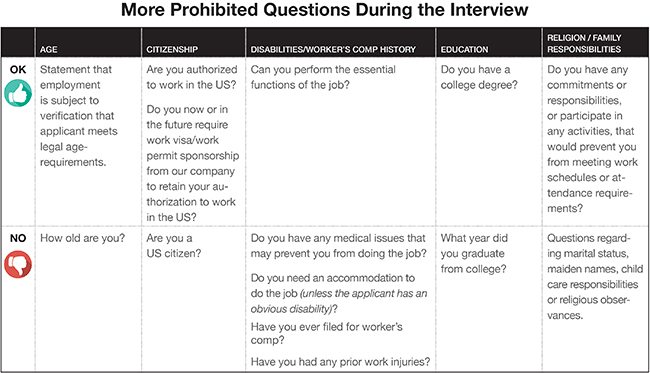
How to Conduct Lawful Job Interviews
By Mark Diana, Esq. On Aug 8, 2016Hiring has never been harder. Federal and state laws prohibit employers from asking more and more questions, forcing employers to make hiring decisions with less and less information. To stay on the right side of the law, employers should be mindful of these basic interviewing do’s and don’ts.
General Interviewing Guidelines
- Keep it job related. Only ask questions focused on the candidate’s education, work experience, skills and abilities, along with the particulars of the job sought to establish whether an applicant is sufficiently qualified to perform the job for which you are interviewing. Use a job description to guide the questions.
- Be uniform. Ask the same questions and apply the same standards for selection with respect to each applicant for the same position.
- Be neutral. Don’t let your personal background or preferences influence your decisions.
- Answer an applicant’s questions about the company’s policies and practices by referring to or using language from the handbook or by describing past practices.
- Listen carefully to and take good notes of each applicant’s responses to your questions.
- Do not pursue an inappropriate subject if raised by the applicant.
- Tell the applicant: when he/she should expect to hear back from you; about the company’s verification policy; and what conditions of employment exist, such as physical examinations, drug tests and criminal record checks.
- Do not tell any applicant that he/she will probably be hired.
Be Prepared to Offer Reasonable Accommodations for the Interview
Employers have an obligation to provide reasonable accommodations to enable applicants with disabilities to participate in a job interview. Accommodations may include: an accessible interview location for people with mobility impairments, a sign language interpreter for a person who is deaf, a reader for a person who is blind, or modified testing for a person with a learning disability. You may not refuse to hire an applicant because you believe the company will not be able to provide the same accommodation if the applicant is hired.
Prohibited Questions During the Interview
Questions about “protected categories” are generally off limits. Here are a few acceptable and unacceptable examples for New Jersey employers:
Criminal Record
No questions about criminal history until after a first interview is completed.
Social Media
Do not ask applicant for social media passwords or user names, what social media sites they use, or to show you their social media postings.
About the Author: Mark Diana is the managing shareholder of the Morristown office of Ogletree Deakins, a labor and employment law firm representing employers of all sizes in New Jersey and nationally.
Related Articles:







